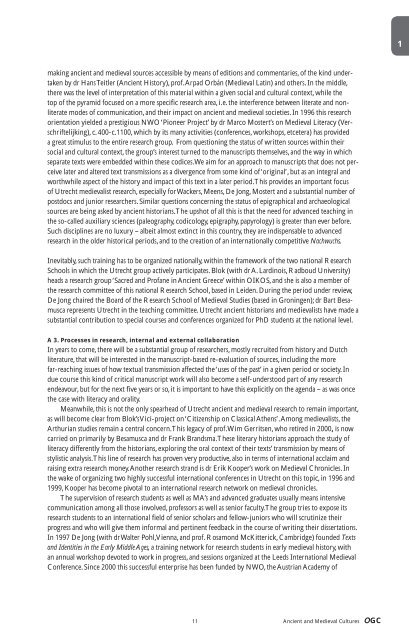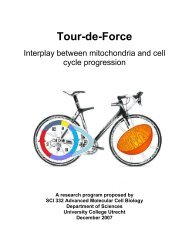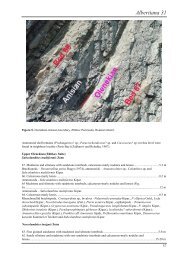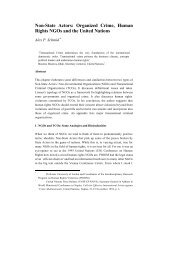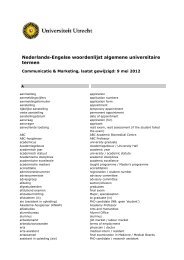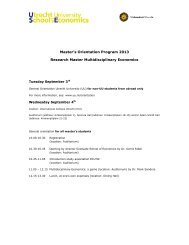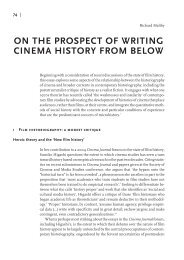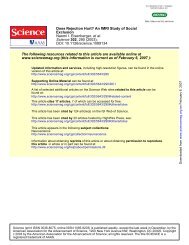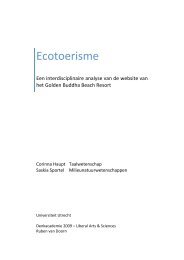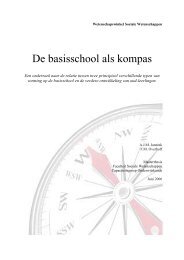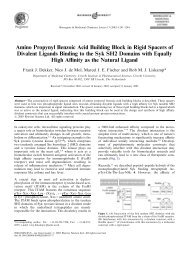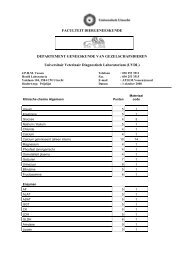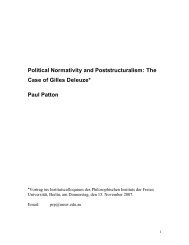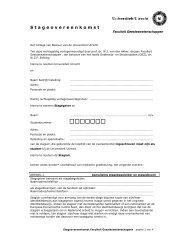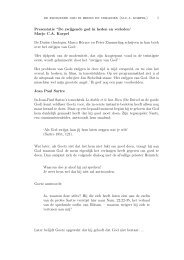Review of the Research Institute for History and - Universiteit Utrecht
Review of the Research Institute for History and - Universiteit Utrecht
Review of the Research Institute for History and - Universiteit Utrecht
Create successful ePaper yourself
Turn your PDF publications into a flip-book with our unique Google optimized e-Paper software.
making ancient <strong>and</strong> medieval sources accessible by means <strong>of</strong> editions <strong>and</strong> commentaries, <strong>of</strong> <strong>the</strong> kind undertaken<br />
by dr Hans Teitler (Ancient <strong>History</strong>), pr<strong>of</strong>. Arpad Orbán (Medieval Latin) <strong>and</strong> o<strong>the</strong>rs. In <strong>the</strong> middle,<br />
<strong>the</strong>re was <strong>the</strong> level <strong>of</strong> inter pretation <strong>of</strong> this material within a given social <strong>and</strong> cultural context, while <strong>the</strong><br />
top <strong>of</strong> <strong>the</strong> pyramid focused on a more specifi c research area, i.e. <strong>the</strong> interference between literate <strong>and</strong> nonliterate<br />
modes <strong>of</strong> com munication, <strong>and</strong> <strong>the</strong>ir impact on ancient <strong>and</strong> medieval societies. In 1996 this research<br />
orientation yielded a prestigious NWO ‘Pioneer Project’ by dr Marco Mostert’s on Medieval Literacy (Verschriftelijking),<br />
c. 400-c.1100, which by its many activities (conferences, workshops, etcetera) has provided<br />
a great stimulus to <strong>the</strong> entire research group. From questioning <strong>the</strong> status <strong>of</strong> written sources within <strong>the</strong>ir<br />
social <strong>and</strong> cultural context, <strong>the</strong> group’s interest turned to <strong>the</strong> manuscripts <strong>the</strong>mselves, <strong>and</strong> <strong>the</strong> way in which<br />
separate texts were embedded within <strong>the</strong>se codices. We aim <strong>for</strong> an approach to manuscripts that does not perceive<br />
later <strong>and</strong> altered text transmissions as a divergence from some kind <strong>of</strong> ‘original’, but as an integral <strong>and</strong><br />
worthwhile aspect <strong>of</strong> <strong>the</strong> history <strong>and</strong> impact <strong>of</strong> this text in a later period. This provides an important focus<br />
<strong>of</strong> <strong>Utrecht</strong> medievalist research, especially <strong>for</strong> Wackers, Meens, De Jong, Mostert <strong>and</strong> a substantial number <strong>of</strong><br />
postdocs <strong>and</strong> junior researchers. Similar questions concerning <strong>the</strong> status <strong>of</strong> epigraphical <strong>and</strong> archaeological<br />
sources are being asked by ancient historians. The upshot <strong>of</strong> all this is that <strong>the</strong> need <strong>for</strong> advanced teaching in<br />
<strong>the</strong> so-called auxiliary sciences (paleography, codicology, epigraphy, papyrology) is greater than ever be<strong>for</strong>e.<br />
Such disciplines are no luxury – albeit almost extinct in this country, <strong>the</strong>y are indispensable to advanced<br />
research in <strong>the</strong> older historical periods, <strong>and</strong> to <strong>the</strong> creation <strong>of</strong> an internationally competitive Nachwuchs.<br />
Inevitably, such training has to be organized nationally, within <strong>the</strong> framework <strong>of</strong> <strong>the</strong> two national <strong>Research</strong><br />
Schools in which <strong>the</strong> <strong>Utrecht</strong> group actively participates. Blok (with dr A. Lardinois, Radboud University)<br />
heads a research group ‘Sacred <strong>and</strong> Pr<strong>of</strong>ane in Ancient Greece’ within OIKOS, <strong>and</strong> she is also a member <strong>of</strong><br />
<strong>the</strong> research committee <strong>of</strong> this national <strong>Research</strong> School, based in Leiden. During <strong>the</strong> period under review,<br />
De Jong chaired <strong>the</strong> Board <strong>of</strong> <strong>the</strong> <strong>Research</strong> School <strong>of</strong> Medieval Studies (based in Groningen); dr Bart Besamusca<br />
represents <strong>Utrecht</strong> in <strong>the</strong> teaching committee. <strong>Utrecht</strong> ancient historians <strong>and</strong> medievalists have made a<br />
substantial contribution to special courses <strong>and</strong> conferences organized <strong>for</strong> PhD students at <strong>the</strong> national level.<br />
A 3. Processes in research, internal <strong>and</strong> external collaboration<br />
In years to come, <strong>the</strong>re will be a substantial group <strong>of</strong> researchers, mostly recruited from history <strong>and</strong> Dutch<br />
literature, that will be interested in <strong>the</strong> manuscript-based re-evaluation <strong>of</strong> sources, including <strong>the</strong> more<br />
far-reaching issues <strong>of</strong> how textual transmission affected <strong>the</strong> ‘uses <strong>of</strong> <strong>the</strong> past’ in a given period or society. In<br />
due course this kind <strong>of</strong> critical manuscript work will also become a self-understood part <strong>of</strong> any research<br />
endeavour, but <strong>for</strong> <strong>the</strong> next fi ve years or so, it is important to have this explicitly on <strong>the</strong> agenda – as was once<br />
<strong>the</strong> case with literacy <strong>and</strong> orality.<br />
Meanwhile, this is not <strong>the</strong> only spearhead <strong>of</strong> <strong>Utrecht</strong> ancient <strong>and</strong> medieval research to remain important,<br />
as will become clear from Blok’s Vici-project on ‘Citizenship on Classical A<strong>the</strong>ns’. Among medievalists, <strong>the</strong><br />
Arthurian studies remain a central concern. This legacy <strong>of</strong> pr<strong>of</strong>. Wim Gerritsen, who retired in 2000, is now<br />
carried on primarily by Besamusca <strong>and</strong> dr Frank Br<strong>and</strong>sma. These literary historians approach <strong>the</strong> study <strong>of</strong><br />
literacy differently from <strong>the</strong> historians, exploring <strong>the</strong> oral context <strong>of</strong> <strong>the</strong>ir texts’ transmission by means <strong>of</strong><br />
stylistic analysis. This line <strong>of</strong> research has proven very productive, also in terms <strong>of</strong> international acclaim <strong>and</strong><br />
raising extra research money. Ano<strong>the</strong>r research str<strong>and</strong> is dr Erik Kooper’s work on Medieval Chronicles. In<br />
<strong>the</strong> wake <strong>of</strong> organizing two highly successful international conferences in <strong>Utrecht</strong> on this topic, in 1996 <strong>and</strong><br />
1999, Kooper has become pivotal to an international research network on medieval chronicles.<br />
The supervision <strong>of</strong> research students as well as MA’s <strong>and</strong> advanced graduates usually means intensive<br />
communication among all those involved, pr<strong>of</strong>essors as well as senior faculty. The group tries to expose its<br />
research students to an international fi eld <strong>of</strong> senior scholars <strong>and</strong> fellow-juniors who will scrutinize <strong>the</strong>ir<br />
progress <strong>and</strong> who will give <strong>the</strong>m in<strong>for</strong>mal <strong>and</strong> pertinent feedback in <strong>the</strong> course <strong>of</strong> writing <strong>the</strong>ir dissertations.<br />
In 1997 De Jong (with dr Walter Pohl, Vienna, <strong>and</strong> pr<strong>of</strong>. Rosamond McKitterick, Cambridge) founded Texts<br />
<strong>and</strong> Identities in <strong>the</strong> Early Middle Ages, a training network <strong>for</strong> research students in early medieval history, with<br />
an annual workshop devoted to work in progress, <strong>and</strong> sessions organized at <strong>the</strong> Leeds International Medieval<br />
Conference. Since 2000 this successful enterprise has been funded by NWO, <strong>the</strong> Austrian Academy <strong>of</strong><br />
11 Ancient <strong>and</strong> Medieval Cultures OGC<br />
1


